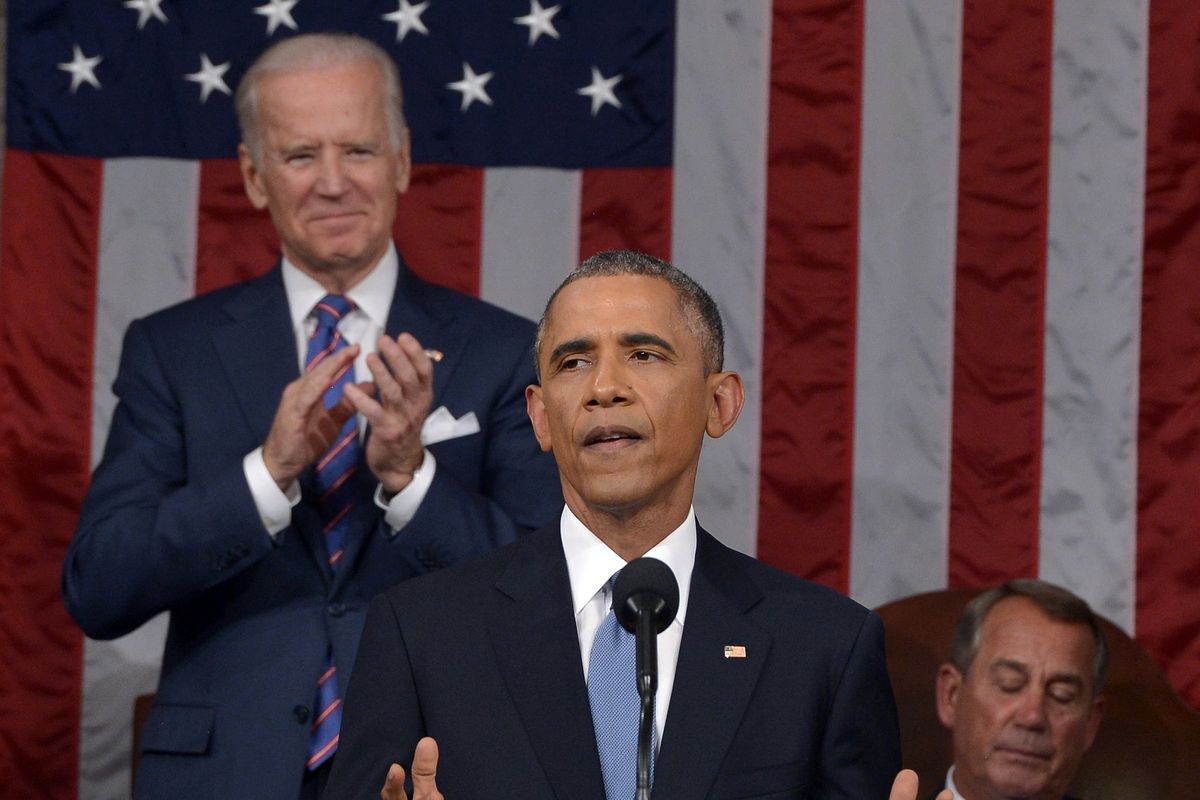Obama outlines agenda to bolster middle class
President proposes tax hikes for rich, new programs to spread the wealth

WASHINGTON – President Barack Obama worked to frame his final years in office Tuesday as a time of national recovery from unpopular wars and deep recession, striving now to help a middle class left behind by an otherwise growing economy.
“It has been, and still is, a hard time for many,” he said in his second-to-last State of the Union address. “But tonight, we turn the page.”
He drew a broad portrait of a liberal economic program that would take billions from the wealthiest Americans and use it to finance a long list of programs for the working and middle classes.
“Will we accept an economy where only a few of us do spectacularly well?” Obama asked a joint session of Congress gathered in the Capitol where he took office exactly six years earlier. “Or will we commit ourselves to an economy that generates rising incomes and chances for everyone who makes the effort?”
Speaking for the first time to a Congress that is now entirely Republican-led, Obama suggested ways he could work with the House of Representatives and the Senate, including on tax reform and trade.
But he also seized for himself – and presumably for 2016 Democrats – the banner of income inequality, arguing that while the U.S. economy is recovering and Wall Street is booming, the middle class still needs a boost.
His speech suggested a framework for the coming campaign for a new president, one where top Republicans already signal they plan to stress the fact that the middle class lost ground in the Obama years while offering conservative alternatives to boost jobs and wages.
Republicans, who took control of both chambers in November on a platform that included vows to cut spending, had rejected many of Obama’s proposals before he began speaking.
“The American people aren’t demanding talking-point proposals designed to excite the base but not designed to pass,” Senate Majority Leader Mitch McConnell, R-Ky., said Tuesday on the Senate floor. “Challenge us with truly serious, realistic reforms that focus on growth and raising middle-class incomes – reforms that don’t just spend more money we don’t have.”
Sen. Joni Ernst of Iowa delivered the Republican response, offering an alternative vision of governing.
“We heard the message you sent in November – loud and clear,” said Ernst, whose November victory helped Republicans take control of the Senate. “Now we’re getting to work to change the direction Washington has been taking our country.”
Obama called for $320 billion in tax increases over the next 10 years, including fees on certain Wall Street companies, eliminating a “trust fund loophole” the White House says allows the super-rich to pass on estates tax-free, and raising the top tax on investment gains for the wealthy.
The White House argued that 99 percent of the effect of the tax proposals would be on the top 1 percent in the country, echoing a catchall phrase used to describe the very wealthy.
In return, Obama proposed using the new tax revenues to make two years of community college free for students, tripling the child care tax credit to $3,000 per child, increasing the minimum wage, providing workers with paid leave and creating a second-earner tax credit of up to $500 for families.
Obama appeared unchastened by the loss of Democratic control of the Senate. Instead, he seemed bolstered by the rising poll numbers that have come along with a recovering U.S. economy.
“At this moment, with a growing economy, shrinking deficits, bustling industry and booming energy production, we have risen from recession freer to write our own future than any other nation on Earth,” he said. “It’s now up to us to choose who we want to be over the next 15 years and for decades to come.”
The economy is now strong enough that it needs to invest in the middle class, he argued, seeking to answer critics who note that middle-class wages have remained stagnant on his watch even as the overall economy has grown.
“At every moment of economic change throughout our history, this country has taken bold action to adapt to new circumstances, and to make sure everyone gets a fair shot,” Obama said.
His fair shot included renewing a call for free preschool for every 4-year-old, to be paid for by an increase in tobacco taxes.
And he called on Congress to pass the Healthy Families Act, which would allow working Americans to earn up to seven days a year of paid sick time. He said his budget will call for $2 billion in new money to encourage states to develop paid family and medical leave programs.
He also called for tax relief for small businesses that begin retirement plans for their employees.
Obama’s speech came amid an uprising in Yemen, which Obama last year pointed to as a model of counterterrorism cooperation as he has resisted pressure to intervene militarily at flashpoints around the globe.
Although he used the speech to formally ask Congress to authorize the use of force against the Islamic State, he stressed that the U.S. is not considering ground troops.
“Instead of getting dragged into another ground war in the Middle East, we are leading a broad coalition, including Arab nations, to degrade and ultimately destroy this terrorist group,” Obama said. “This effort will take time. It will require focus. But we will succeed.”